Every year, August 12th is celebrated as the International Day of the Youth. With the development narrative in our country centred on economic growth – and not on social welfare or political participation – the urban youth are busy trying to be financially independent. They are often disengaged from civic issues and the needs of the people around them. But is this always the case?
Last month, I attended a sale of reused and recycled materials organised by the online community Second to None, which attempts to reduce waste in the city. But the highlight of my day was meeting a group of youth who spent their entire Saturday volunteering with us, with enthusiasm and broad smiles.
I wondered, what motivated them to volunteer on a weekend when everyone else I knew were probably snuggled in their bed watching Netflix, or were walking down Church Street and Indiranagar to find the right pub. I interviewed a few youth volunteers from our city to find out what they do in their spare time, and why.
Building a movement
Eco Sunday, a volunteer group that holds weekly cleanliness drives in the city, was started by two teenagers. Jerome Robin, 18, and Krtin Kannan, 19, are second-year students at the New Horizon College of Engineering. The two friends frequently used to comment on issues like climate change and pollution on social media. Ten weeks back, they decided to actually do something about these issues.
Robin says, “Initially, we wanted to plant trees, but apparently one needs permission from the authorities for this. Also, you have to nurture what you planted. So, we thought – why not start by cleaning our surroundings every Sunday, for a few hours.” The duo organised their first clean-up drive in Cubbon Park with just six volunteers. The group collected six bags of waste, weighing 15 kgs, just from a part of the park.
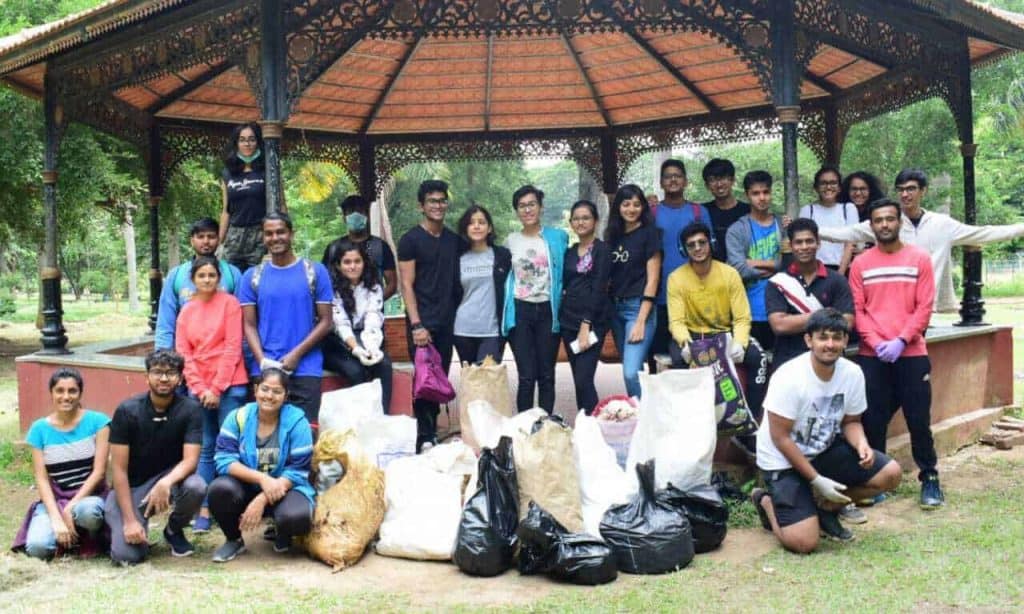
Eco Sunday volunteers after a cleaning drive at Lalbagh Botanical Garden. Pic: Eco Sunday
Since then, the community has been growing on social media. Eco Sunday’s Instagram page now has over 340 followers. Kannan says, “We got new followers three weeks ago, on putting up a poster inviting volunteers for our Lalbagh drive. The poster went viral, and 24 people responded – our highest till date.” Overall, 27 volunteers picked up 15 bags of non-biodegradable waste in that drive.
In addition to volunteers from the online community, the group welcomes anyone who wants to join their drives on the spot. “We have influenced a lot of people to lead greener lives. At the Lalbagh drive, we ran into some tourists who were shocked to see our initiative. At the end of the drive, we not only did something for the environment, but also made friends, met complete strangers who were like-minded, and had a lot of fun,” says Kannan.
Offering a helping hand
Little More Love (LML) is a Bengaluru-based youth movement that aims to build a community through tangible acts of love and service. Its volunteers visit orphanages, old age homes, hospitals, and other places that need support. They organise music sessions, art activities, washing of utensils and clothes, gardening, and more service projects every weekend.
Bhavana Sringeri, 20, an LML volunteer and final year engineering student at BNM Institute Of Technology, says, “Volunteering, to me, is about connecting with the people out there, listening to their story, and helping them any way I can. I feel we are always given a little extra – maybe it’s our time or money – so why not give it back to society.”
She recounted that her most heartening experience so far was a visit to the Kidwai Memorial Institute of Oncology, where she spent time with young cancer patients, colouring and singing songs with them.
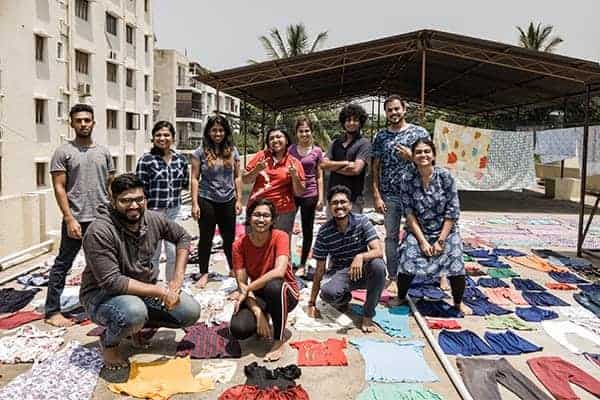
LML volunteers at Shishu Bhavan, an orphanage that takes care of abandoned children. Pic: LML
Empowering children
Sharanya Ullal, 20, a third-year BBA student at CHRIST (Deemed to be) University, has been volunteering with the NGO U&I for almost three years. Sharanya is involved with U&I’s after-school programme, that gives underprivileged students one-on-one attention that is generally unavailable in their schools.
Sharanya says, “Some extra care and attention can go a long way for these students. This is a nine-month commitment where the volunteer has to spend 2.5 hours a week with the students. Each volunteer teaches three children”.
Often youth struggle to manage their time efficiently, but for Sharanya it’s about making time to help change someone’s future. “Monday blues are totally defeated when my baby screams ‘Sharanya Akka..’ Our generation is the future of this country, and we need more young volunteers,” she says.
Vasu Gowda, 24, is a social science teacher at the Vagdevi Vilas School in Bidadi. He has been conducting the Junior Youth Spiritual Empowerment Program (JYSEP) in different parts of Bengaluru for the past five years, mentoring children aged 12-15 years.
Children in this age group experience rapid physical and mental changes that are often misunderstood. JYSEP is a global programme, inspired by the Bahá’í International Community, that prepares these children to participate in their communities. The programme exposes children to service projects like planting trees, visiting people from marginalised communities, and conducting awareness campaigns to address local issues. The group meets every week for about half a day.
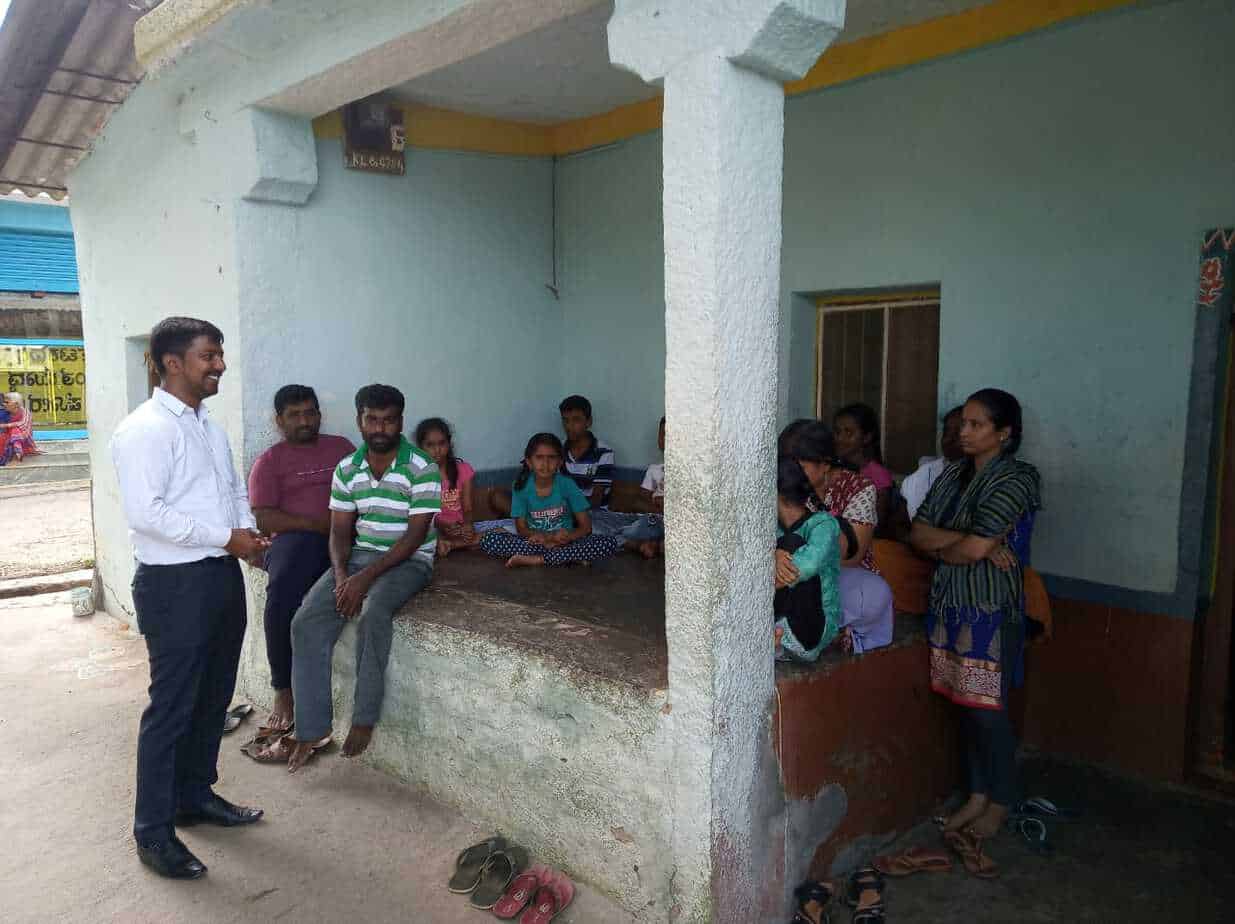
Vasu Gowda visiting the homes of junior youth, to interact with parents and local community. Pic : Vasu Gowda
All for the planet
Fridays for Future (FFF) is a youth-led global climate strike movement that sends a clear and peaceful message for climate justice. It urges all signatory countries to comply with the Paris Agreement immediately.
This May, FFF Bengaluru organised a climate strike to highlight the lack of effective climate legislation in India. People of various age groups and occupations participated in the event in front of Town Hall.
According to FFF volunteer Arvind Deenadayalan, 25, “Taking out a couple of hours for volunteering every week is possible, though most of us are stuck in our corporate jobs, studies and personal commitments”. FFF has called for another climate strike on September 20th. They are expecting large numbers of youth to participate, including school children with whom they are collaborating.
“We just have 10 years to revive our planet. If we don’t act now, we are putting the future of the planet and the next generation at risk,” says Deenadayalan. After attending FFF gatherings for the last few months, Deenadayalan has made several changes in his personal life, such as switching to a wooden toothbrush, carrying reusable bags, reducing meat consumption, and using public transport more often.
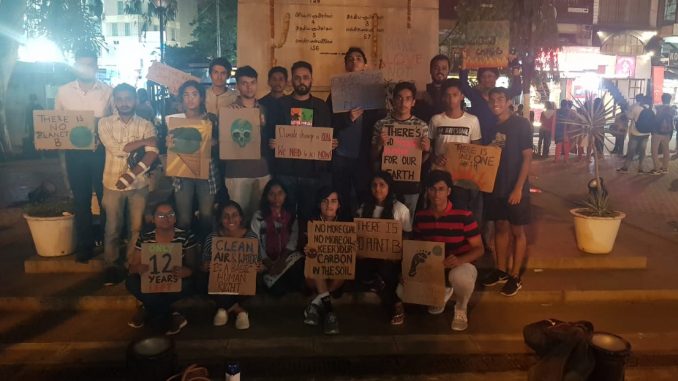
FFF volunteers gathered at Brigade Road junction to discuss climate change and demand climate justice. Pic: FFF
Feeding the hungry
Sanjna Ullal, 23, a student at Monash University in Australia, had volunteered with the non-profit Feeding India in 2017-18. The organisation aims to solve the problems of hunger, malnutrition and food waste. It collects excess food from individuals, weddings, restaurants etc, and redistributes it to those in need.
Sanjna says, “I worked and volunteered simultaneously at the time. Working at a corporate, I was confined to a space I wasn’t very fond of – it was like making someone in a place of power even more powerful. I had privilege, so I thought I should be doing something about it; that’s how I started volunteering with Feeding India.”
She gave a lot of time to the organisation, and could see the impact of her actions. She says, “When you start working with people, you understand the place of privilege you are coming from, you start realising how you have lived in a blinded world. But volunteering requires commitment. You are not doing people a favour; you and the organisation need to be clear about this.”
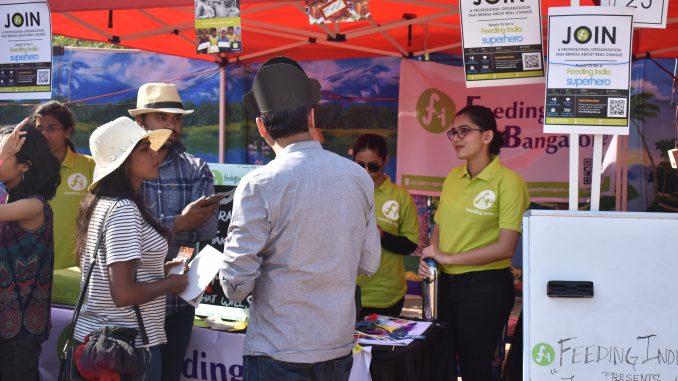
Sanjna Ullal (extreme right) volunteering at a Feeding India fundraiser in 2018. Pic : Sanjna Ullal
Bengaluru’s youth are evidently looking for opportunities to volunteer, and in some cases, they are creating these opportunities themselves. Witnessing tangible change, more awareness, commitment, compassion, and opportunities to associate with like-minded peers, are prompting our youth to volunteer actively.
The State of the World’s Volunteerism Report (SWVR) states that “healthy societies need young people who are involved with their communities; and volunteer action can be a highly effective route towards such involvement.”
In our country, engaging youth in ‘nation-building’ has been part of the popular discourse. But this idea of nation-building is centred on building skills that guarantee employment. Our education system too fosters individualism among young people, disconnecting them from society.
I feel that service to society should be seen as an integral part of building one’s life and the nation. Volunteering builds young people’s capacity to transform not just society, but also their personal lives and careers.
There are several such cases that I know of, and have attempted to document here, in the hope that we are all inspired to serve and bring about lasting change.
Bengaluru, let’s make our city better, and as the popular quote goes, “If many little people, in many little places, do many little things, they can change the face of the earth”.